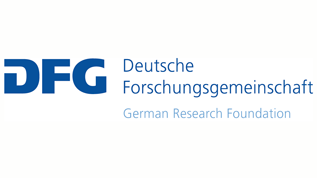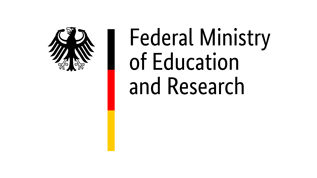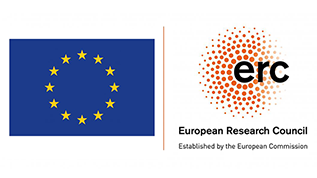Programme “Frontiers in Policy Relevant Population Research”
The international conference took place from 3 to 5 July 2023 in Wiesbaden. It was organised around three strands that reflect key themes in population research.
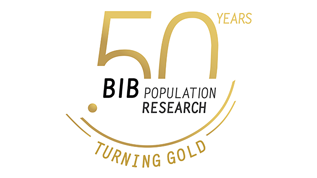
- Day 1: Monday, July 3
- Day 2: Tuesday, July 4
- Day 3: Wednesday, July 5
- Conference Venue
- Programme and Overview (PDF)
Day 1: Monday, July 3
| Time | Venue | Strand 1 3 Years of FReDA: Families and Partnerships in Germany and Europe | Strand 2 Internal Mobility and International Migration Across the Life Course | Strand 3 Mortality Trends and Future Prospects for Longevity in Times of Great Uncertainty |
|---|---|---|---|---|
| 09:45 | Museum | Good Morning Coffee and Registration | ||
| 10:30 | Museum | Words of Welcome: C. Katharina Spieß (BiB) and Organisation Committee | ||
| 10:45 | Museum | World Café – Policy Relevance of Research | ||
| 12:00 | Museum | Lunch Break | ||
| 13:15 | Federal Statistical Office | Parallel Sessions I | ||
Arrangements of paid work and care work Chair: Robert Naderi (BiB) | Internal migration and commuting Chair: Nikola Sander (BiB) | Measuring excess mortality in times of pandemics Chair: Sebastian Klüsener (BiB) | ||
Short-time work, unemployment and parental leave: Gendered differences in (unpaid) labour-market outcomes Clara Schäper (DIW, BSE, University of Potsdam), Katharina Wrohlich and Sabine Zinn (DIW) | Commuting, gender and children Malte Borghorst (University of Duisburg-Essen), Ismir Mulalic (Copenhagen Business School), Jos van Ommeren (Free University of Amsterdam) | East-West mortality divide during the COVID-19 pandemic in Europe: Methodological considerations, empirical results and possible explanations Vladimir M. Shkolnikov (MPIDR), Sergey Timonin (ANU), Dmitry Jdanov (MPIDR), Nazrul Islam and David A. Leon (LSHTM) | ||
Employment patterns during early motherhood in West Germany, East Germany and Hungary Lili Vargha (Humboldt Universität zu Berlin), Antonino Polizzi (Nuffield College, University of Oxford & MPIDR), Anette Eva Fasang (Humboldt Universität zu Berlin) | The untold story of internal migration in Germany: Patterns, developments, and the role of education Sebastian Vogler, Anton Barabasch and Kamila Cygan-Rehm (all LIfBi), Guido Heineck (University of Bamberg) | Empirical prediction intervals applied to short-term mortality forecasts and excess deaths Jonas Schöley and Ricarda Duerst (MPIDR) | ||
Day-care quality and child personality matter: Experimental evidence on influence on norms of day-care use and parental working hours Pia Schober, Viktoria Werner, Marie-Fleur Philipp and Silke Büchau (University of Tübingen), C. Katharina Spieß (BiB & Johannes Gutenberg University Mainz) | Access to universities and migration decisions of young adults Philipp Markus (University of Duisburg-Essen) | Spatial variation in excess mortality in Europe: A cross-sectional study of 561 regions in 21 countries Florian Bonnet (INED), Pavel Grigoriev, Markus Sauerberg, Ina Alliger and Michael Mühlichen (BiB), Carlo-Giovanni Camarda (INED) | ||
Working from home and work-family interface: Importance of role salience Deniz Yucel (William Paterson University of New Jersey), Inga Laß (BiB) | Contributions of causes of death to mortality differentials between movers and stayers in the Netherlands Maximilian Frentz-Göllnitz and Adrien Remund (University of Groningen), Lenny Stoeldraijer (CBS), Janine van der Toorn (EMC), Gabriele Doblhammer (University of Rostock), Fanny Janssen (NIDI) | |||
| 14:45 | Federal Statistical Office | Coffee Break | ||
15:00 | Federal Statistical Office | Parallel Sessions II | ||
Fertility and family planning Chair: Jasmin Passet-Wittig (BiB) | Causes and consequences of migration Chair: Andreas Ette (BiB) | Mortality trends in the US and Europe Chair: Jacques Vallin (INED) | ||
Multipartnered fertility in northern Europe: A sequence analytical approach to reveal gender inequalities in fertility with consecutive partners Stefano Arnolfo and Nicole Hiekel (MPIDR) | Global Scholarly (im)mobility, migration, and integration Aliakbar Akbaritabar (MPIDR) | The deterioration of life expectancy trends in the United States: Understanding the contribution of geographic disparities Magali Barbieri (UC Berkeley, INED), Celeste Winant (UC Berkeley) | ||
Education and intended number of children in Germany, Moldova and Norway: An international comparison using FReDA-GGS-Data Sandra Krapf (ifb Bamberg), Isabella Buber-Ennser (VID), Martin Bujard (BiB) | Transnational emotional support networks of refugees in Germany: Variations by gender and country of origin Ludovica Gambaro, Lenore Sauer and Elisabeth Kraus (BiB) | Trends of life expectancy in European cross-border regions between 1992-2020 Sophie Stroisch (University of Groningen, University of Oldenburg), Michael Mühlichen and Pavel Grigoriev (BiB), Rok Hrzic (Maastricht University), Tobias Vogt (University of Groningen) | ||
Fertility intentions and behaviour: An analysis of interethnic couples in Germany Giulia Costantini and Stefani Scherer (University of Trento) | How weather and conflict shocks affected internal displacement in Somalia Lisa Thalheimer (UNU-EHS) | Economic Europeanization and regional mortality disparities in Central and Eastern Europe Rok Hrzic (Maastricht University), Pavel Grigoriev (BiB) | ||
The impact of the COVID-19 Pandemic on fertility plans in Germany Ruth Overmann (Universität der Bundeswehr München), Anne-Kristin Kuhnt (University of Rostock) | Home ownership and single-family housing: How they relate to employment and family dynamics across the generations of immigrants in Sweden Mary Abed Al Ahad and Hill Kulu (University of St Andrews), Gunnar Andersson (Stockholm University) | |||
| 16:30 | Federal Statistical Office | Coffee Break | ||
| 16:45 | Federal Statistical Office | Parallel Keynotes I | ||
50 Years of family and fertility surveys: A reflection on measurement instruments and scientific discoveries Anne Gauthier (NIDI) | Links between internal and international migration over the life course Sergi Vidal (Autonomous University of Barcelona) | |||
| 17:45 | End of Day 1 | |||
| 19:00 | TBA | Get Together | ||
Day 2: Tuesday, July 4
| Time | Venue | Strand 1 3 Years of FReDA: Families and Partnerships in Germany and Europe | Strand 2 Internal Mobility and International Migration Across the Life Course | Strand 3 Mortality Trends and Future Prospects for Longevity in Times of Great Uncertainty |
|---|---|---|---|---|
| 09:00 | Good Morning Coffee and Registration | |||
| 09:30 | Parallel Keynotes II | |||
Assessing sexual-minority respondents’attitudes, behaviours, and outcomes: Quantitative findings from pairfam & FReDA Karsten Hank (University of Cologne) | Intergenerational socioeconomic and cultural consequences of migration of Turkey-origin labour migrants in Europe Ayse Guveli (University of Essex) | What are we learning about socioeconomic inequalities in mortality in Europe? Alyson Van Raalte (MPIDR) | ||
| 10:30 | Coffee Break | |||
| 11:00 | Federal Statistical Office | Parallel Sessions III | ||
Gender ideology and partnerships Chair: Detlev Lück (BiB) | Consequences of migration Chair: Irena Kogan (University of Mannheim) | Sub-national mortality trends and differentials Chair: Markus Sauerberg (BiB) | ||
Declined traditionalism or widespread diversification? Gender ideologies in contemporary East and West Germany Leonie Kleinschrot (German Youth Institute) | Birthright citizenship, parental involvement and children's education Elena Ziege (BiB) | Measuring and interpreting area-level mortality determinants: Some methodological considerations Domantas Jasilionis, László Németh and Dmitri Jdanov (MPIDR) | ||
Life course transitions and gender ideologies across adolescence and young adulthood: How romantic relationships, educational pathways, and labour market experiences affect young people’s beliefs Janna Wilhelm (University of Tübingen) | Will the COVID-19 pandemic increase ethnic inequality? New immigrants’ socio-cultural integration in challenging times Claudia Diehl (University of Konstanz), Matthias Koenig (Heidelberg University), Cornelia Kristen (University of Bamberg), Daniel Degen (University of Konstanz), Julia Rüdel (Heidelberg University), Julian Seuring (University of Bamberg) | When geography contradicts history: The case of gender differences in life expectancy France Meslé and Jacques Vallin (INED) | ||
Same or different worlds? Multidimensional gender ideology among men and women in Germany Viktoria-Rosalie Oellers, Daniela Grunow, Natalie Nitsche and Daniele Florean (Goethe-University Frankfurt am Main) | Correlations between family characteristics and short-term economic outcomes of emigrants Lisa Mansfeld (University of Duisburg-Essen) | Drivers of population change in Danish municipalities Óskar Daði Jóhannsson (CPop, CED), Marie-Pier Bergeron Boucher (CPop) | ||
They are for each other? Gender attitudes at the couple level and the transition to marriage in Germany Daniele Florean (Goethe-University Frankfurt am Main) | The gender gap in returns to study abroad experiences Nicolai Netz, Frauke Peter and Fine Cordua (DZHW) | Long-term health effects of the Chernobyl accident in Ukraine Nataliia Levchuk (NAS of Ukraine, MPIDR), Laura Ann Cilek (BiB), Jonas Schöley and Domantas Jasilionis (MPIDR) | ||
Income pooling strategies: Unpacking the heterogeneity within the ‘Cohabitation-Marriage Gap’ in Europe Flavia Mazzeo (NIDI), Nicole Hiekel (MPIDR), Agnese Vitali (University of Trento) | Recommendations on the collection and analyses of migration-related determinants in public health research Carmen Koschollek (RKI), Katja Kajikhina (MPIIB), Marleen Bug and Claudia Hövener (RKI) | |||
| 12:45 | Federal Statistical Office | Lunch Break | ||
| 13:45 | Federal Statistical Office | Parallel Sessions IV | ||
Family relations Chair: Lena Frembs (BiB) | Poster session Chairs: Elisabeth Kraus and Nils Witte (both BiB) | Measuring and interpreting health and mortality outcomes Chair: Carlo Giovanni Camarda (INED) | ||
The effects of family life-course events on sibling relationships in young and middle adulthood Marcel Raab (ifb Bamberg), Matthias Klingler (University of Bamberg), Florian Schulz (ifb Bamberg) | Monitoring internal migration flows using origin–destination data based on Twitter user locations Long Nguyen (University of Bielefeld) | Estimating kin loss due to violent deaths in Mexico: A subnational microsimulation approach Antonino Polizzi (University of Oxford), Diego Alburez-Gutierrez (MPIDR) | ||
Intergenerational relationships in low status migrant families: Curse or blessing for social mobility? Juan Deininger and Petra Böhnke (Universität Hamburg) | How the deterioration of soil, caused by climate change, affects internal migration Keiti Kondi (UCLouvain) | Cause of death statistics in Japan and future orientation in the ICD-11 era Reiko Hayashi (IPSS) | ||
The hidden burden? The linkage of care norms, work-life stress and maternal wellbeing in Germany Sabine Diabaté (BiB) | Hard-to-reach, harder to research? First lessons from an App-RDS on rejected asylum seekers’ im-/mobility decisions Randy Stache, Laura Peitz and Lisa Johnson (Research Centre: Migration, Integration and Asylum at the Federal Office for Migration and Refugees) | Introduction to the German National Cohort (NAKO) Ulrich Mueller, Andrea Werdecker and Ronny Westerman (BiB) | ||
Ongoing intensification of suburbanization? The impact of COVID-19 on internal migration in Germany Tamilwai Kolowa, Nico Stawarz and Nikola Sander (BiB) | Challenging prevailing stereotypes about gender differences in health reporting: Evidence using biomarker data from the Health and Retirement Study Anna Oksuzyan (University of Bielefeld), Maciej J. Dańko, Jennifer Caputo, Mine Kühn and Yana Vierboom (MPIDR) | |||
International migration and shifts in subjective well-being: A longitudinal study using German panel data Andreas Genoni, Nico Stawarz, Heiko Rüger and Andreas Ette (BiB) | ||||
The role of non-cognitive skills for ethnic stratification in education Eleonora Vlach (Goethe University Frankfurt am Main), Loris Vergolini (University of Bologna) | ||||
Intergenerational returns to migration: Evidence from Italian migrants worldwide Guido Neidhöfer and Chiara Malavasi (ZEW Mannheim) | ||||
| 15:15 | Museum | Coffee Break | ||
| 16:00 | Museum | Plenary Keynote “Unlocking the Power of Early Education and Care: The Key to Understanding Population Dynamics” – C. Katharina Spieß, Director of the BiB | ||
| 16:45 | Museum | Plenary Panel Discussion: Dialogue with Policy Actors; Participants: Ayse Guveli, Karsten Hank, Mélanie Levasseur, Alyson van Raalte, C. Katharina Spieß, Sergi Vidal | ||
| 17:30 | BiB Garden | BiB Anniversary Party | ||
Day 3: Wednesday, July 5
| Time | Venue | Strand 1 3 Years of FReDA: Families and Partnerships in Germany and Europe | Strand 2 Internal Mobility and International Migration Across the Life Course | Strand 3 Mortality Trends and Future Prospects for Longevity in Times of Great Uncertainty |
|---|---|---|---|---|
| 08:45 | Good Morning Coffee and Registration | |||
09:15 Federal Statistical Office | Parallel Sessions V | |||
COVID-19 and mental health/methods Chair: Sophia Schmitz (BiB) | Spatial ethnic segregation and its consequences Chair: Heiko Rüger (BiB) | Socioeconomic inequalities in mortality Chair: Felix zur Nieden (Federal Statistical Office of Germany) | ||
Gender inequality in childcare and mental health during the COVID-19 pandemic in Germany. Do gender role attitudes matter? Mine Kühn (MPIDR & Tilburg University), Nicole Hiekel (MPIDR) | Leaving behind the factories of despair: Intergenerational effects on educational attainment during the Great Black Migration Andreas Vortisch (University of Luxembourg) | Are we all similar before death? Socio-demographic inequalities in pathways to death in Sweden Marcus Ebeling (MPIDR), Anna C. Meyer and Karin Modig (Karolinska University) | ||
Change or challenge: Who provides consent to data transfer due to an institutional change in a self-administered family panel? Almut Schumann (BiB), Claudia Schmiedeberg (University of Munich) | There goes the Auswahlbezirk: Estimating the “White-Flight” effect with the Microcensus Klaus Pforr (GESIS) | What a difference a day makes: School starting age effects on mortality Mathias Huebener (BiB), Jan Marcus (FU Berlin), Shushan Margaryan (University of Potsdam) | ||
Concurrent, web-first, push-to-web, or web-only? How different mode choice sequences perform in recruiting participants in a self-administered family demographic panel study Pablo Christmann and Tobias Gummer (GESIS), Armando Häring (infas), Tanja Kunz and Anne-Sophie Oehrlein (GESIS), Michael Ruland (infas), Lisa Schmid (GESIS) | Ethnic segregation in a stratified school system: Does ability tracking hamper ‘white flight’ from local schools? Hanno Kruse (University of Bonn), Janna Teltemann (University of Hildesheim), Jörg Dollmann (German Centre for Integration and Migration Research DeZIM) | Measuring widowhood duration: Theoretical developments & empirical evidence for France Julie Tréguier (DIW Berlin), Carole Bonnet (INED), Didier Blanchet (INSEE) | ||
Names, diversity and innovation Anna Kremer (TU Dresden & ifo Dresden) | Contribution of past trends in socio-economic inequalities in longevity to overall trends in life expectancy Jesus-Daniel Zazueta-Borboa (NIDI, University of Groningen), Ugofilippo Basellini (INED), Pekka Martikainen (University of Helsinki, MPIDR, Stockholm University), Emilio Zagheni (MPIDR), Fanny Janssen (NIDI, University of Groningen) | |||
| 10:45 | Coffee Break | |||
| 11:00 | Federal Statistical Office | Parallel Sessions VI | ||
Division of household labour Chair: Kerstin Ruckdeschel (BiB) | The migration-mobility-nexus Chair: Sergi Vidal (Autonomous University of Barcelona) | Mortality trends and differentials in Germany Chair: Eva Kibele (State Office for Statistics Bremen) | ||
Task-specific differences in couples’ division of domestic work: A comparative analyses for Europe Gundula Zoch (University of Oldenburg), Stefanie Heyne (Mannheim Centre for European Social Research:MZES) | How internal migration, international migration and commuting have changed in Germany over the past decades Nico Stawarz, Andreas Genoni and Heiko Rüger (BiB), Thomas Skora (GESIS), Andreas Ette (BiB), Matthias Rosenbaum-Feldbrügge (Radboud University), Nikola Sander (BiB) | Increasing stillbirth rates in Germany: The influence of changes in population structure Maxi Stella Kniffka (MPIDR), Roland Rau (MPIDR, University of Rostock), Jonas Schöley, Mine Kühn and Natalie Nitsche (MPIDR) | ||
Gender egalitarianism and outsourcing: Complementary or competing strategies for addressing work-family conflict? Liat Raz-Yurovich (The Hebrew University of Jerusalem) | Internal and international migration in “Schengenland”: Selectivity and labour market performance of graduate migration from Italy and Spain Jose David Lopez Blanco (University Carlos III) | Possibilities and limitations in the analysis of cause-of-death-specific mortality on the basis of multi-causal data: COVID-19 mortality in Bavaria 2020-2021 Andrea Buschner (Bavarian State Office for Statistics) | ||
The division of routine and non-routine Housework among migrant and native couples in Germany Theresa Nutz, Lisa Schmid and Reinhard Pollak (GESIS) | What shapes international students’ post-graduation migration intentions? Knut Petzold and Marie Siebenhaar (Hochschule Zittau/Görlitz – University of Applied Sciences) | Area-based socioeconomic inequalities in cancer mortality in Germany: An ecological study based on cause of death statistics 2003 to 2019 Fabian Tetzlaff, Jens Hoebel, Niels Michalski and Enno Nowossadeck (RKI) | ||
The gendered division of cognitive household labour, mental load, and family-work conflict in european countries Andreas Haupt (Karlsruhe Institute of Technology) | Demographic turnover and the migration system in Spain Osama Damoun, Andreu Domingo and Jordi Bayona-i-Carrasco (Centre for Demographic Studies/Autonomous University of Barcelona) | The contribution of mortality after a myocardial infarction to rural-urban mortality differences in Germany Marcus Ebeling (MPIDR), Michael Mühlichen and Sebastian Klüsener (BiB) | ||
| 12:30 | Parallel Conclusion Moderation: Lena Frembs, Emily Lines and Detlev Lück (BiB) | Parallel Conclusion Moderation: Elisabeth Kraus and Nils Witte (BiB) | Parallel Conclusion Moderation: Pavel Grigoriev, Sebastian Klüsener and Markus Sauerberg (BiB) | |
| 12:45 | End of Conference | |||
Conference Venue
The conference will take place at two venues:
Museum Wiesbaden
Hesse State Museum of Art and Nature
Friedrich-Ebert-Allee 2, 65185 WiesbadenFederal Statistical Office of Germany (Destatis)
Statistisches Bundesamt
Gustav-Stresemann-Ring 11
65189 Wiesbaden
The BiB Anniversary Celebration at Day 2 (July 4) will take place at the BiB which is located directly next to the Museum Wiesbaden.
Programme and Overview (PDF)
Download: Programme (pdf, 573KB) and Overview of the BiB anniversary week (pdf, 1MB)
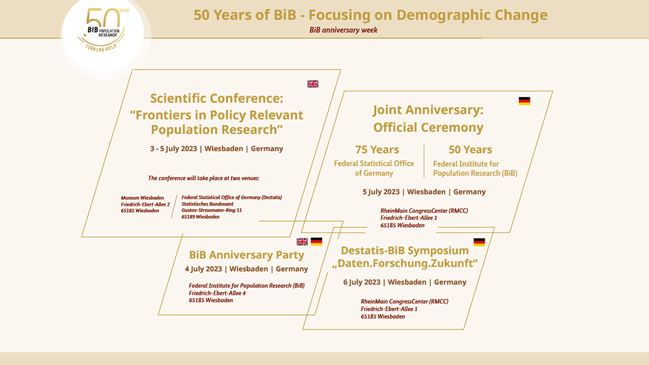
![]() Overview of the BiB anniversary week
Overview of the BiB anniversary week
Conference funded by:
|
|
|

